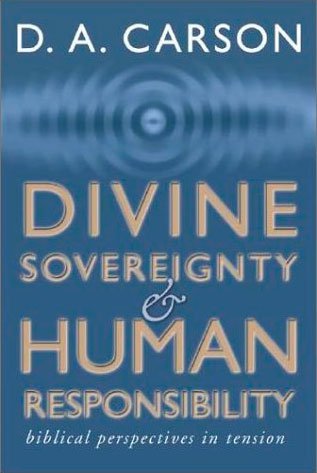 Heard a sermon today that left me pondering, among other things, the long-felt tension between God’s sovereignty (and the extent of his sovereignty, but we’ll leave that one alone) and man’s responsibility, primarily in the sphere of salvation. A book on the subject that I’ve turned to over the years is D. A. Carson’s Divine Sovereignty & Human Responsibility: Biblical perspectives in tension. For my sake, and perhaps yours, I’ve decided that it’s my responsibility today to record here in this blog several sections from this book.
Heard a sermon today that left me pondering, among other things, the long-felt tension between God’s sovereignty (and the extent of his sovereignty, but we’ll leave that one alone) and man’s responsibility, primarily in the sphere of salvation. A book on the subject that I’ve turned to over the years is D. A. Carson’s Divine Sovereignty & Human Responsibility: Biblical perspectives in tension. For my sake, and perhaps yours, I’ve decided that it’s my responsibility today to record here in this blog several sections from this book.
And lest you, the reader, think that this is one very dry topic and you’ll now turn elsewhere to find something more refreshing, Carson’s handling of the topic is really good, his writing really is interesting, and the topic really is relevant to every moment of your life and mine.
The first quotation comes from the introduction: Continue reading
 I made a quick trip to Rapid City this evening to pick up some materials for a basement finish job that we’re doing (as
I made a quick trip to Rapid City this evening to pick up some materials for a basement finish job that we’re doing (as  It occurred to me this morning that there are three main characters in the parable found in
It occurred to me this morning that there are three main characters in the parable found in  It’s been a while, but I started reading
It’s been a while, but I started reading  I’m going to guess that you either think you’ve heard God’s voice, or you know someone who says that they have heard God speak to them. This post, then, is for you and hopefully will help you filter through these ideas and/or experiences. I’m going to quote
I’m going to guess that you either think you’ve heard God’s voice, or you know someone who says that they have heard God speak to them. This post, then, is for you and hopefully will help you filter through these ideas and/or experiences. I’m going to quote